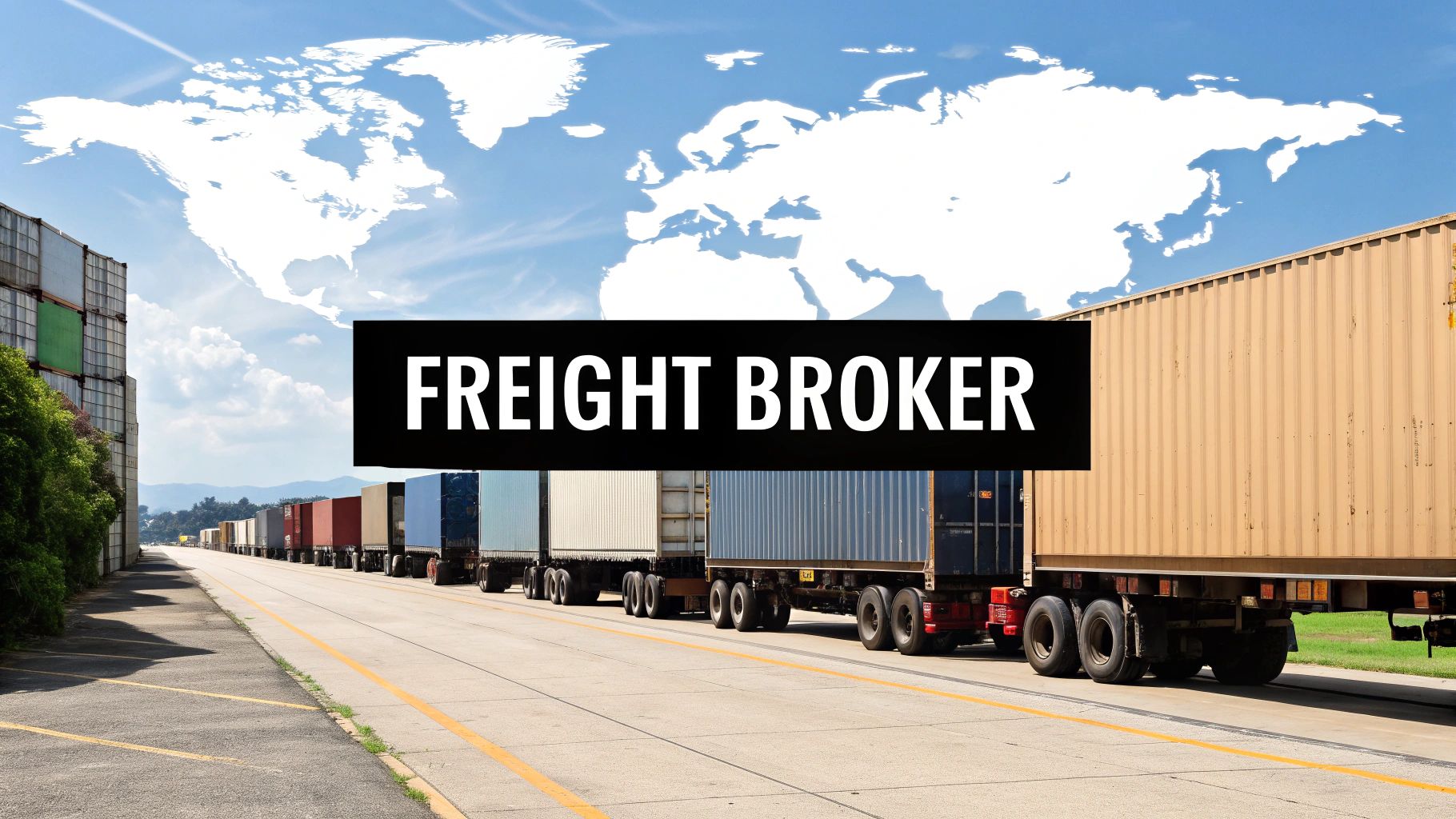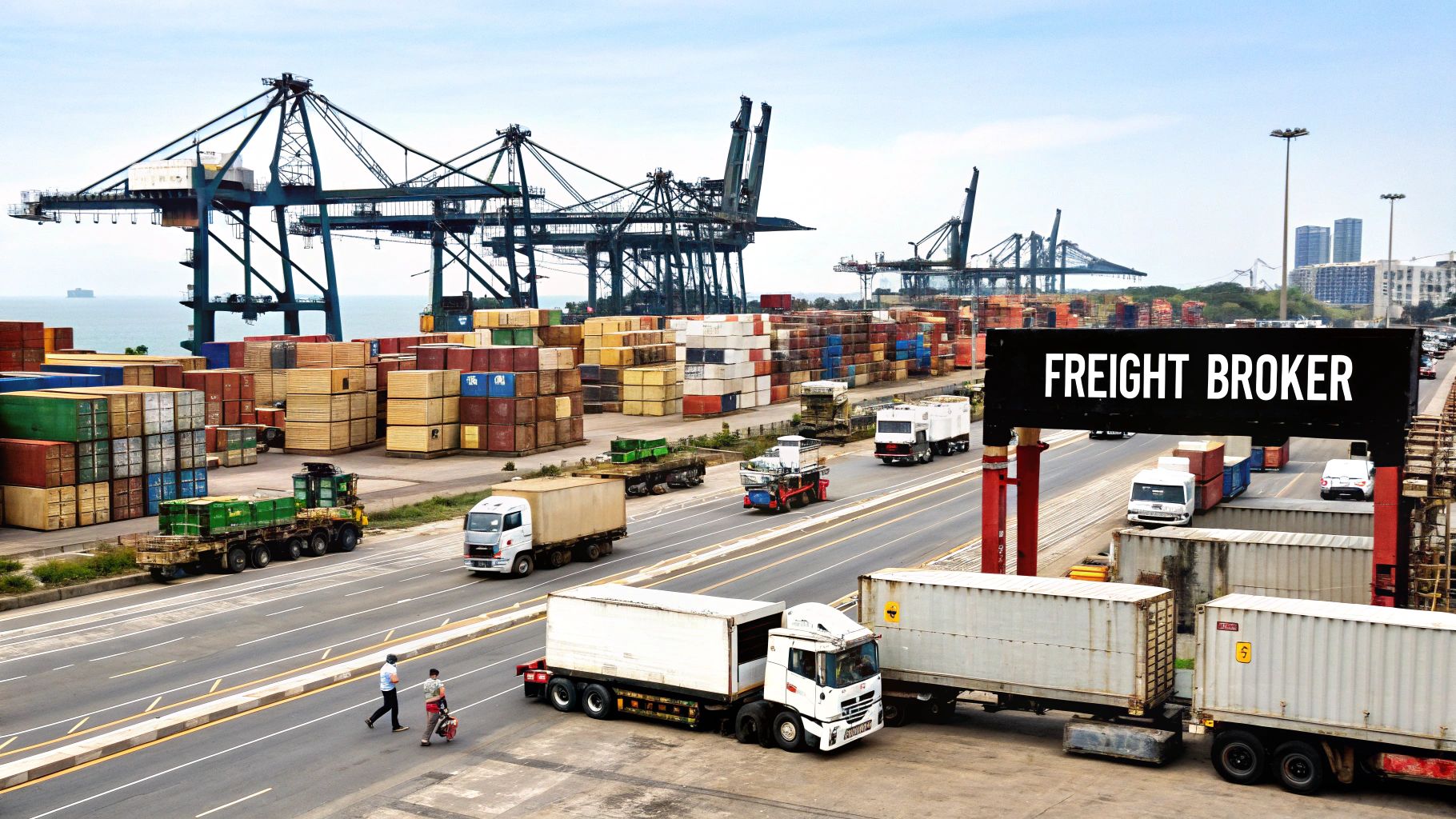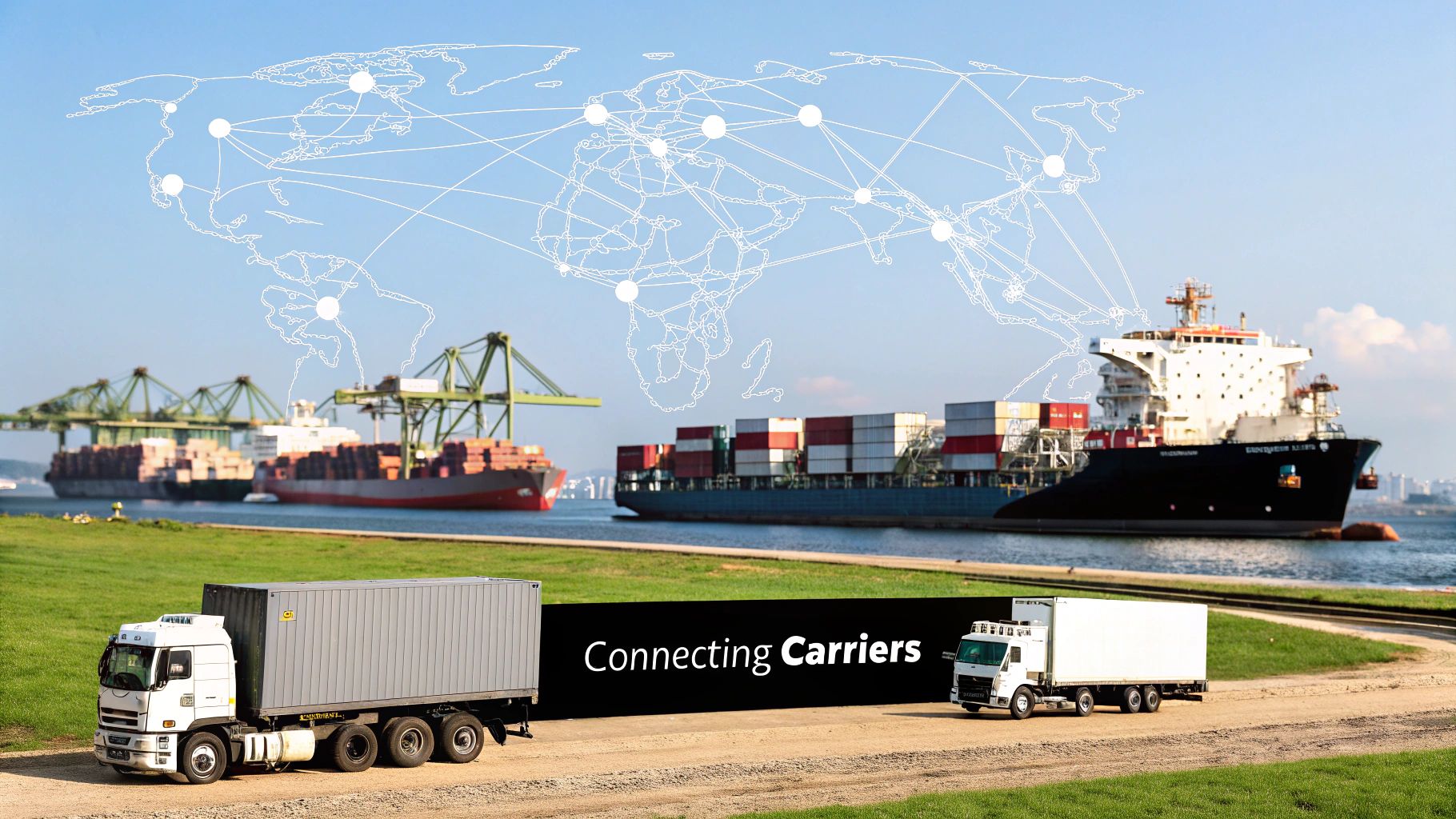Discover the freight broker definition, what they do, and how they simplify shipping. Learn everything you need to know in our comprehensive guide.

Ever wondered how all that stuff you buy gets from the factory to the store? A big part of that answer involves a freight broker.
At its heart, a freight broker is the ultimate matchmaker in the shipping world. They connect businesses that have goods to move (we call them shippers) with the trucking companies that have the trucks and drivers to move them (carriers). They make sure products get from Point A to Point B smoothly, on time, and without breaking the bank.

Think of it like this: a freight broker is a travel agent, but for cargo. A travel agent doesn't own the planes or the hotels, right? Their value comes from their massive network and insider knowledge. They find you the perfect flight at the best price.
That’s exactly what a freight broker does for shipping. They don't own the trucks. Instead, they use their expertise to find the right carrier for your specific needs, whether you have enough cargo to fill a whole truck (Full Truckload or FTL) or just a few pallets (Less-Than-Truckload or LTL).
This whole matchmaking service came about to fix a classic supply-and-demand problem in the market. Shippers couldn't always find trucks, and truckers couldn't always find freight. Brokers stepped in to bridge that gap, and their role is more crucial than ever. For a deeper dive, check out these keys to broker success on dat.com.
By handling all the moving parts, brokers save shippers a ton of time, money, and headaches.
A good broker does a lot more than just find a driver. They're your logistics quarterback, calling the plays and managing the entire process from start to finish.
Here’s a look at what they typically handle:
In essence, a freight broker simplifies complexity. They transform the daunting task of finding a reliable carrier into a single, managed transaction, allowing businesses to focus on their core operations instead of logistics headaches. This hands-on management is what makes them indispensable partners in modern supply chains.

So, what does a freight broker actually do all day? It's much more than just answering phones. Think of them as a logistics command center, a negotiator, and a problem-solver all rolled into one. It’s a fast-paced role where no two days are quite the same.
Let’s pull back the curtain on a typical shipment.
The whole process often kicks off before most people have had their first cup of coffee. A business owner—the shipper—realizes they have an urgent order that needs to get across the country. Instead of scrambling to find a truck, they make one call to their freight broker.
The broker immediately gets to work, gathering all the critical details: what’s being shipped, where it’s headed, its exact weight and dimensions, and the delivery deadline.
With the shipment specs in hand, the broker dives into their massive, pre-vetted network of carriers. This is where their expertise really shines. The shipper avoids the headache of calling dozens of trucking companies; the broker can quickly pinpoint the right carrier for the job, whether it's a full truckload (FTL) or a smaller less-than-truckload (LTL) shipment.
Next comes the negotiation. They work to find that perfect balance—a competitive rate for the shipper that’s also fair for the carrier who will be hauling the freight.
Once a carrier is locked in, the broker shifts into an administrative role.
A broker's job involves managing a mountain of crucial paperwork. One small error can bring a shipment to a screeching halt, so they ensure every document is perfect. A great example of this is the Bill of Lading (BOL), which acts as the legal contract between the shipper and the carrier. To understand why it's so important, check out our guide on what a Bill of Lading is.
Once the truck is loaded and on the move, the broker's role evolves again. They become the single point of contact for the shipper, the driver, and the receiver. No more phone tag or wondering where your freight is—the broker provides real-time tracking and constant updates.
This is also where their problem-solving skills become invaluable. What happens if the truck blows a tire, hits a massive traffic jam, or gets delayed by a freak snowstorm? The broker is the one who gets that call and immediately starts working on a solution, whether it's rerouting the driver or coordinating a new delivery window.
They're the ones who turn potential disasters into minor hiccups.
Let's take a closer look at the key tasks a broker handles to make every shipment a success.
The table below breaks down the essential jobs a freight broker manages from start to finish.
Ultimately, by managing the entire journey, a freight broker transforms what can be a stressful, complex process into a seamless and professional operation.

You might be tempted to think of a freight broker as just a go-between, but that’s selling them short. In reality, they create a genuine win-win situation for everyone involved in getting goods from Point A to Point B. For shippers, it’s like instantly unlocking a massive, pre-vetted network of trucking companies that would take ages to build from scratch.
And for carriers? It’s a steady stream of paying jobs. This two-way street is what makes the whole supply chain hum. Shippers get a logistics pro in their corner, and carriers get a sales team working for them, letting each side focus on what they do best.
If your business needs to move products, bringing a freight broker into the mix offers some serious perks. The biggest one? Gaining immediate access to thousands of qualified carriers. Think about it: instead of spending a whole day cold-calling trucking companies, you just make one call to your broker.
On top of that, brokers have some serious negotiating muscle because of the sheer volume of freight they handle day in and day out. They can often lock in much better rates for both FTL and LTL shipments than a single business could ever hope to get on its own.
Plus, they take a huge administrative burden off your plate. From finding the perfect truck to wrangling paperwork and tracking the shipment’s progress, the broker handles it all. That frees you up to actually run your business.
For the trucking companies and owner-operators out there, freight brokers are an absolute necessity. A truck sitting idle isn't earning a dime, and brokers are masters at keeping those wheels turning.
A carrier’s biggest headache is often "empty miles"—driving back from a delivery with an empty trailer, which is pure cost with zero revenue. Brokers are the solution, finding shippers who need something moved along that exact return route.
This steady flow of work helps carriers stay on the road making money instead of wasting time hunting for their next gig. In essence, they get to outsource their entire sales effort, letting drivers drive and dispatchers manage the fleet.
At the end of the day, this relationship makes the entire industry more efficient and profitable. Shippers get their freight moved reliably at a fair price, and carriers keep their trucks loaded and their business healthy. It’s the kind of fundamental partnership that keeps our economy rolling.
If you really want to get a handle on what a freight broker does day-to-day, you first need to understand the two main ways freight gets moved: Full Truckload (FTL) and Less Than Truckload (LTL). Picking the right one is a constant balancing act between cost, speed, and keeping your cargo safe.
Think of it like this. FTL is like chartering a private jet for your goods. You get the whole truck to yourself, and it goes straight from Point A to Point B with only your products on board. This is perfect when you have a massive shipment that fills the whole trailer, or if you're moving something high-value, fragile, or on a tight deadline. No stops, no detours.
LTL, on the other hand, is the commercial flight of the shipping world. Your smaller shipment gets a spot on a truck alongside cargo from other companies. It’s a fantastic way to save money when you don't have enough stuff to justify a whole truck, since you’re only paying for the space your freight takes up.
This is where a good broker really earns their keep—by helping you figure out which option makes the most sense. There's no single "best" choice; it all comes down to your shipment's size, your budget, and how quickly you need it there.
With FTL, transit times are almost always faster because the driver's only destination is yours. LTL shipments naturally take a bit longer since the truck makes multiple stops to pick up and drop off other freight along the way.
Another huge factor is handling. In an FTL shipment, your cargo is loaded once at the start and unloaded once at the end. That’s it. This dramatically cuts down the risk of damage. LTL freight gets handled a lot more—it's moved from truck to truck at different terminals, which inherently adds more touchpoints and potential for bumps and bruises. To get a better feel for this, you can explore what LTL stands for in shipping in our detailed guide.
This decision tree visualizes some of the core things to think about when getting into the brokerage business, highlighting just how important solid knowledge and resources are from the very beginning.

As the graphic shows, getting started in brokering—much like choosing the right shipping method for a client—begins with a clear-eyed look at your goals and what you have to work with.
A broker's value also comes from their deep understanding of what's happening in the market right now. For instance, recent data showed that between 2022 and 2023, some contract truckload rates dropped by about 13%, with another 6% dip expected. This is the kind of insider knowledge that allows a broker to fight for the best possible rates for their clients.
In the end, a freight broker is your logistics strategist. They dig into what you need—cost savings, speed, security—and find the perfect match, whether that's the non-stop service of FTL or the budget-friendly approach of LTL.
Their guidance saves you from paying for a half-empty truck or, worse, choosing a method that puts your valuable cargo at risk. This is the strategic thinking at the heart of what it means to be a modern freight broker.
In today's world, the supply chain is the engine that keeps commerce humming. Freight brokers have grown far beyond their old-school role as simple matchmakers—they're now the conductors of a massive logistics orchestra.
Their job isn't just about making phone calls anymore. Modern brokers are strategic partners, using powerful data to help businesses build smarter, more resilient supply chains that can handle whatever comes their way.
This shift is all thanks to technology. Brokers now rely on sophisticated Transportation Management Systems (TMS) that offer real-time shipment tracking, predictive analytics, and instant communication. This tech pulls back the curtain on the shipping process, giving companies a level of visibility and control that was once unimaginable. It's how they find trucks during capacity crunches, navigate unexpected disruptions, and find the absolute best routes to save time and money.
A huge part of a broker's value is their ability to read the market and protect their clients from volatility. Technology is a major driver of change, so to see where things are headed, it helps to understand the impact of AI on business and its ripple effects in logistics. By digging into the data, brokers can help shippers see what's coming around the corner.
For instance, forecasts for 2025 point to a modest 1.6% volume growth in the U.S. trucking sector, despite ongoing challenges like having too many trucks on the road. The industry's freight indices have a knack for being incredibly accurate—often hitting 96-98% precision—which gives brokers a reliable pattern to work with. This is exactly the kind of insight a good broker brings to the table, helping you budget and plan with confidence.
A modern freight broker is more than a service provider; they are a logistics intelligence partner. They translate complex market data into actionable strategies that save shippers money, reduce risk, and improve overall supply chain performance.
At the end of the day, a freight broker has become essential for any competitive business. They bring the expertise, technology, and connections needed to move goods smoothly in a world that only gets more complicated. They’re no longer just a nice-to-have, but a crucial piece of any successful shipping strategy.
Finding the right freight broker is a big deal. You're not just moving boxes; you're trusting someone with a critical piece of your business. A great broker acts as a true logistics partner, protecting your cargo and your reputation, while a bad one can cause headaches you don't need.
So, where do you start? The search for a professional, trustworthy broker begins with a few absolute must-haves.
First off, check their credentials. Every legitimate broker in the U.S. has to be licensed with the Federal Motor Carrier Safety Administration (FMCSA). Ask for their MC (Motor Carrier) number and look them up online—it's a quick and easy first step. They're also required to have a surety bond or trust fund, which is your financial safety net if things go sideways.
Once you've covered the legal basics, it's time to dig into how they actually operate. A great broker is a master communicator. Are they responsive? Do they get back to you quickly? Are they transparent when problems pop up?
You'll find that the best ones invest in being available. Many even use professional business phone answering services to make sure a real person is there to handle important calls, no matter what. That level of commitment is a huge green flag.
Technology is the other major piece of the puzzle. Ask them about their Transportation Management System (TMS). You're looking for a few key things:
Choosing a broker is like hiring a key employee for your logistics team. Their expertise, network, and technology directly impact your bottom line and customer satisfaction. Take the time to vet them thoroughly.
Finally, a broker is only as good as their carrier network. A reputable firm will have solid, long-standing relationships with hundreds, if not thousands, of reliable carriers. This is what allows them to find you a truck for your FTL or LTL freight, even when capacity is tight.
As you explore your options, it's also worth understanding the tech that powers it all. Our guide on how freight quote tracking works dives deeper into this. Asking the right questions upfront will help you find a partner who will truly support your business goals.
Even once you get the basic idea, a few practical questions always seem to pop up when you're thinking about working with a freight broker. Let's tackle some of the most common ones to clear up any confusion and help you feel more confident about how it all works.
Think of this as the "real world" side of the freight broker definition—the details that really matter when you’re trying to decide if a broker is a good fit for your business.
This is probably the number one question we hear, and the answer is actually pretty simple. Brokers earn their money on the "spread"—the difference between what the shipper pays them and what they pay the trucking company.
Let's say a shipper needs a full truckload moved and agrees to pay a broker $2,500 for the job. The broker then taps into their network and finds a reliable carrier willing to haul it for $2,200. That $300 gap is the broker's gross profit. It's what covers their overhead, technology, and the expertise they provide to make sure everything goes smoothly from start to finish.
It feels a bit backward, doesn't it? How can adding a middleman actually save you money? But in the world of freight, it often does.
The key is volume. A single business might ship a few loads a week, but a broker is moving hundreds or even thousands. This massive buying power gives them access to much better rates from carriers than most individual businesses could ever negotiate on their own.
When you add up the time you save by not having to search for trucks, vet carriers, and handle all the administrative work, the total cost is often much lower with a broker. It’s not just about the price on the invoice; it’s about the overall efficiency.
The real value of a broker isn't just the final price; it's the total cost savings you achieve by avoiding logistical headaches, accessing better rates, and freeing up your team to focus on your core business.
This is another one that trips people up, but the main difference boils down to a single concept: who touches the freight.
Here’s a simple analogy: a broker is like a travel agent who books your flight, while a forwarder is more like a full tour operator who not only books the flight but also handles your luggage and tickets directly. Both get you where you need to go, but they play slightly different roles.
Ready to see how a broker can simplify your shipping?
At FreightQuotesNow, we make it easy to get competitive quotes for your LTL or FTL shipments. Find the best rate in minutes. Get free quote